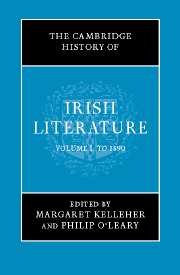Book contents
- Frontmatter
- Introduction
- 1 The literature of medieval Ireland to c. 800: St Patrick to the Vikings
- 2 The literature of medieval Ireland, 800–1200: from the Vikings to the Normans
- 3 The literature of later medieval Ireland, 1200–1600: from the Normans to the Tudors
- 4 Literature in English, 1550–1690: from the Elizabethan settlement to the Battle of the Boyne
- 5 Literature in Irish, c.1550–1690: from the Elizabethan settlement to the Battle of the Boyne
- 6 Prose in English, 1690–1800: from the Williamite wars to the Act of Union
- 7 Poetry in English, 1690–1800: from the Williamite wars to the Act of Union
- 8 Literature in Irish, 1690–1800: from the Williamite wars to the Act of Union
- 9 Theatre in Ireland, 1690–1800: from the Williamite wars to the Act of Union
- 10 Irish Romanticism, 1800–1830
- 11 Prose writing and drama in English, 1830–1890: from Catholic emancipation to the fall of Parnell
- 12 Poetry in English, 1830–1890: from Catholic emancipation to the fall of Parnell
- 13 Literature in Irish, 1800–1890: from the Act of Union to the Gaelic League
- 14 Historical writings, 1690–1890
- 15 Literature and the oral tradition
- Guide to major subject areas
- Index
- References
1 - The literature of medieval Ireland to c. 800: St Patrick to the Vikings
Published online by Cambridge University Press: 28 March 2008
- Frontmatter
- Introduction
- 1 The literature of medieval Ireland to c. 800: St Patrick to the Vikings
- 2 The literature of medieval Ireland, 800–1200: from the Vikings to the Normans
- 3 The literature of later medieval Ireland, 1200–1600: from the Normans to the Tudors
- 4 Literature in English, 1550–1690: from the Elizabethan settlement to the Battle of the Boyne
- 5 Literature in Irish, c.1550–1690: from the Elizabethan settlement to the Battle of the Boyne
- 6 Prose in English, 1690–1800: from the Williamite wars to the Act of Union
- 7 Poetry in English, 1690–1800: from the Williamite wars to the Act of Union
- 8 Literature in Irish, 1690–1800: from the Williamite wars to the Act of Union
- 9 Theatre in Ireland, 1690–1800: from the Williamite wars to the Act of Union
- 10 Irish Romanticism, 1800–1830
- 11 Prose writing and drama in English, 1830–1890: from Catholic emancipation to the fall of Parnell
- 12 Poetry in English, 1830–1890: from Catholic emancipation to the fall of Parnell
- 13 Literature in Irish, 1800–1890: from the Act of Union to the Gaelic League
- 14 Historical writings, 1690–1890
- 15 Literature and the oral tradition
- Guide to major subject areas
- Index
- References
Summary
Historical introduction
Literature and scholarship, in Irish and in Latin, were prized and cultivated in early Christian Ireland: what has come down to us from the years ad 600 to 800 is most impressive, in both range and quality. These early texts are the products of an intellectual elite that comprised clerical and secular scholars and authors. There were already some Christians in Ireland early in the fifth century, for in 431 Pope Celestine sent Palladius as first bishop to the Irish who believed in Christ. Since Christianity is a religion of the Book, these Irish Christians must have had individuals among them who were literate in Latin. Some degree of literacy in the Irish language was present even earlier than the fifth century. The oldest surviving records of the Irish language are inscriptions incised in stone in the ogam script. Something under four hundred of these inscriptions survive, and they generally consist of a personal name in the genitive case, accompanied, more often than not, by the name of that person’s father or other ancestor. The earliest inscriptions probably date to the fifth and sixth centuries, and some may belong to the fourth. The invention of the ogam alphabet cannot have occurred later than the fourth century, and it has been suggested that it may date to the end of the second century or the beginning of the third. We know nothing of the identity of the inventor of this alphabet, but we can be sure that he knew Latin and that his invention entailed an analysis of the Irish language.
- Type
- Chapter
- Information
- The Cambridge History of Irish Literature , pp. 9 - 31Publisher: Cambridge University PressPrint publication year: 2006
References
- 2
- Cited by

